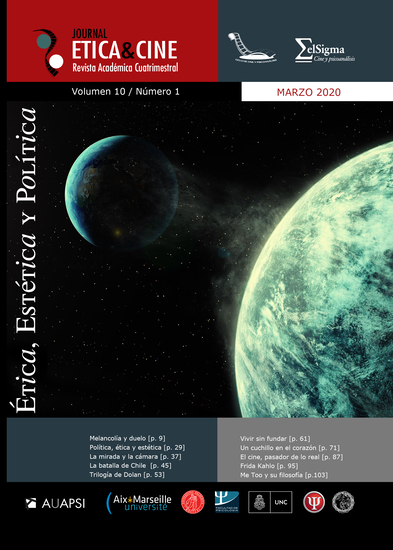Live without founding. Politics and psychoanalysis, again
DOI:
https://doi.org/10.31056/2250.5415.v10.n1.29213Keywords:
Politics, Law, ´´´Psychoanalysis, non-relationshipAbstract
My purpose here will be to try and outline the principle upon which a political bond, free from the imaginary and symbolical preconceptions
which allegedly define the nature of political subjects can be founded. In other words, a political bond which would not be determined by ’society’, and the imaginary and symbolic identifications it forces upon it. Such politics – that I define as minimal – ought to be impervious to the
currently prevailing social discourses. It cannot possibly rely on upon them. Devising politics in such a way boils down to drawing the lessons
from history : basing the political bond upon any Other (be it God, race, sex, money etc.) always ends up justifying inequalities, exclusions, even
executions, in the name of that Other and its imperatives. Should one refuse to conceive of politics in such a way, what happens ? On the one hand,
the subjects – whom we now should call citizens -, thus freed of any social identification, will enjoy equality and universal rights ; on the other
hand, one must have the courage to accept a political bond whose legitimacy does not stem from that Other. Thus judicial and political minimalism
enables citizens to form political bonds independently of social relationships : political bonding necessarily entails a rejection of social bonding.
To conceive of a bond which will not be subservient to a master signifier, to attempt to ‘decomplete’ the Other and to conceive of the relationship
as a non-relationship cannot be done without the contribution of Lacan’s works. Once again, it leads us to tackle the oft-discussed question of the
connection between politics and psychoanalysis.
References
Deleuze, G. y Guattari, F. (1991). Qu’est-ce que la philosophie? [¿Qué es la filosofía?]. París: Les éditions de Minuit.
Fabre-Magnan, M. (2018). L’institution de la liberté [La institución de la libertad], París: PUF.
Foucault, M. (1975). Vigilar y castigar. Nacimiento de la prisión. París: Editions Gallimard.
Foucault, M. (1994a). La volonté de savoir [La voluntad de saber], "Non au sexe roi" ["No al sexo rey"], Nº 200, Dits et
écrits, vol. III, París: Gallimard
Foucault, M. (1994b). "Le triomphe social du plaisir sexuel : une conversation avec Michel Foucault", ["El triunfo social del placer sexual: una conversación con Michel Foucault], vol. IV.
García, T. (2018). Nous. París: Le livre de poche.
Kintzler, C. (1984). Condorcet, l’instruction publique et la naissance du citoyen [Condorcet, la instrucción pública y el nacimiento del ciudadano] París: Gallimard.
Kintzler, C. (2007). Qu’est-ce que la laïcité ? [¿Qué es la laicidad?]. París: Vrin.
Milner, J.C. (1983). Les noms indistincts [Los nombres indistintos]. París: Seuil.
Milner, J. C. (2003) Las inclinaciones criminales de la Europa democrática. París: Verdier.
Milner, J.C. (2017). Consideraciones sobre Francia, Conversación con Philippe Petit (París: Les éditions du Cerf.
Lacan, J. (1974-1975). RSI, Séminaire 1974-1975. París: Editions de l’Association Freudienne Internationale.
Lacan, J. (2001). "Préface à l’édition anglaise du Séminaire XI" ["Prólogo a la edición inglesa del Seminario XI". En Autres écrits [Otros escritos]. París: Seuil.
Downloads
Published
Issue
Section
License
Copyright (c) 2020 Ética y Cine

This work is licensed under a Creative Commons Attribution-ShareAlike 4.0 International License.
Los autores que publiquen en Ética y Cine Journal aceptan las siguientes condiciones:
Los autores/as conservan los derechos de autor © y permiten la publicación a Ética y Cine Journal, bajo licencia CC BY-SA / Reconocimiento - Reconocimiento-CompartirIgual 4.0 Internacional. La adopción de esta licencia permite copiar, redistribuir, comunicar públicamente la obra, reconociendo los créditos de la misma, y construir sobre el material publicado, debiendo otorgar el crédito apropiado a través de un enlace a la licencia e indicando si se realizaron cambios.

Este obra está bajo una licencia de Creative Commons Reconocimiento-CompartirIgual 4.0 Internacional.




